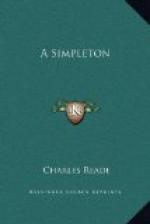“Ay, sir; I could. But I woan’t. I’ll lend ye the things, though, if you have a mind to go with me and buy ’em.”
Falcon agreed, with a lofty smile; and the purchases were made.
Mr. Falcon painted a landscape or two out of his imagination. The dealers to whom he took them declined them; one advised the gentleman painter to color tea-boards. “That’s your line,” said he.
“The world has no taste,” said the gentleman painter: “but it has got lots of vanity: I’ll paint portraits.”
He did; and formidable ones: his portraits were amazingly like the people, and yet unlike men and women, especially about the face. One thing, he didn’t trouble with lights and shades, but went slap at the features.
His brush would never have kept him; but he carried an instrument, in the use of which he was really an artist, viz., his tongue. By wheedling and underselling—for he only charged a pound for the painted canvas—he contrived to live; then he aspired to dress as well as live. With this second object in view, he hit upon a characteristic expedient.
He used to prowl about, and when he saw a young woman sweeping the afternoon streets with a long silk train, and, in short, dressed to ride in the park, yet parading the streets, he would take his hat off to her, with an air of profound respect, and ask permission to take her portrait. Generally he met a prompt rebuff; but if the fair was so unlucky as to hesitate a single moment, he told her a melting tale; he had once driven his four-in-hand; but by indorsing his friends’ bills, was reduced to painting likeness, admirable likenesses in oil, only a guinea each.
His piteous tale provoked more gibes than pity, but as he had no shame, the rebuffs went for nothing: he actually did get a few sitters by his audacity: and some of the sitters actually took the pictures, and paid for them; others declined them with fury as soon as they were finished. These he took back with a piteous sigh, that sometimes extracted half a crown. Then he painted over the rejected one and let it dry; so that sometimes a paid portrait would present a beauty enthroned on the debris of two or three rivals, and that is where few beauties would object to sit.
All this time he wrote nice letters to Phoebe, and adopted the tone of the struggling artist, and the true lover, who wins his bride by patience, perseverance, and indomitable industry; a babbled of “Self Help.”
Meantime, Phoebe was not idle: an excellent business woman, she took immediate advantage of a new station that was built near the farm, to send up milk, butter, and eggs to London. Being genuine, they sold like wildfire. Observing that, she extended her operations, by buying of other farmers, and forwarding to London: and then, having of course an eye to her struggling artist, she told her father she must have a shop in London, and somebody in it she could depend upon.




